 W
WAsa Aikens was an attorney, politician, and judge in Vermont and New York. A veteran of the War of 1812, Aikens served as a Justice of the Vermont Supreme Court from 1823 to 1824.
 W
WJacob Barker was an American financier and lawyer.
 W
WAlvin Bronson was an American businessman and politician from New York.
 W
WJohn Caldwell Calhoun was an American statesman and political theorist from South Carolina who held many important positions including being the seventh vice president of the United States from 1825 to 1832, while adamantly defending slavery and protecting the interests of the white South. He began his political career as a nationalist, modernizer, and proponent of a strong national government and protective tariffs. In the late 1820s, his views changed radically, and he became a leading proponent of states' rights, limited government, nullification, and opposition to high tariffs. He saw Northern acceptance of those policies as a condition of the South remaining in the Union. His beliefs and warnings heavily influenced the South's secession from the Union in 1860–1861.
 W
WDeWitt Clinton, whose name was almost always spelled De Witt during his lifetime and until the late 20th century, was an American politician and naturalist. He served as a United States Senator, Mayor of New York City, and as the sixth Governor of New York. In this last capacity, he was largely responsible for the construction of the Erie Canal. Clinton was a major candidate for the American presidency in the election of 1812, challenging incumbent James Madison.
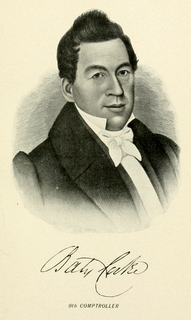 W
WBates Cooke was an American lawyer and politician.
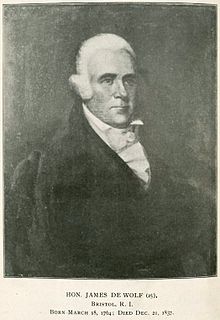 W
WJames DeWolf was a slave trader, a privateer during the War of 1812, and a state and national politician. He served as a state legislator for a total of nearly 25 years, and in the 1820s as a United States senator from Rhode Island for much of a term. Along with the slave trade, DeWolf invested in sugar and coffee plantations in Cuba and became the wealthiest man in his state. By the end of his life, he was said to be the second-richest person in the entire United States. During his lifetime, his name was usually written "James D'Wolf".
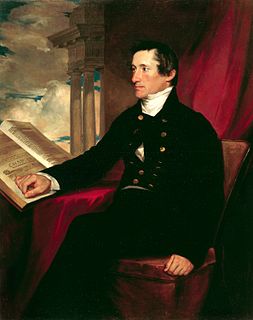 W
WWilliam Drayton was an American politician, banker, and writer who grew up in Charleston, South Carolina. He was the son of William Drayton, Sr., who served as justice of the Province of East Florida (1765–1780).
 W
WSamuel Edwards was an American politician from Pennsylvania who served as a member of the U.S. House of Representatives from Pennsylvania's 1st congressional district from 1819 to 1823 and from Pennsylvania's 4th congressional district from 1823 to 1827.
 W
WWilliam Eustis was an early American physician, politician, and statesman from Massachusetts. Trained in medicine, he served as a military surgeon during the American Revolutionary War, notably at the Battle of Bunker Hill. He resumed medical practice after the war, but soon entered politics.
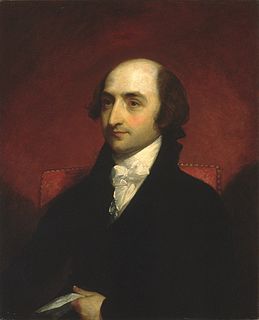 W
WAbraham Alfonse Albert Gallatin, born de Gallatin was a Genevan-American politician, diplomat, ethnologist and linguist. Biographer Nicholas Dungan states that Gallatin was "America's Swiss Founding Father." He is known for being the founder of New York University and for serving in the Democratic-Republican Party at various federal elective and appointed positions across four decades. He represented Pennsylvania in the Senate and the House of Representatives before becoming the longest-tenured United States Secretary of the Treasury and serving as a high-ranking diplomat.
 W
WHorace Holley was an American Unitarian minister and president of Transylvania University in Lexington, Kentucky.
 W
WBill Johnston was a Canadian-American smuggler, river pirate, and War of 1812 privateer. Born in Canada, Johnston was accused of spying in 1812 and he joined the American side of the war and lived the rest of his life in the United States.
 W
WJohn Johnston was an Indian agent in the United States Northwest Territory. He was born on 25 March 1775 near Ballyshannon in the north of Ireland. His father was Scottish and his mother was a Huguenot. He left Ireland when he was eleven years old, travelling to America with a priest and a trusted family friend who was also his tutor. When he emigrated to Pennsylvania in 1786, his father, mother, four brothers, and one sister remained in Ireland. They came to America five years after he settled here.
 W
WJosiah Stoddard Johnston was a United States Representative and Senator from Louisiana. Born in Salisbury, Connecticut, he moved with his father to Kentucky in 1788, and went to Connecticut to attend primary school. He graduated from Transylvania University in 1802, studied law, was admitted to the bar, and commenced practice in Alexandria, Louisiana. He was a member of the Territorial legislature from 1805 to 1812 and during the War of 1812 raised and organized a regiment for the defense of New Orleans, but reached the city after the battle. He engaged in agricultural pursuits and was a State district judge from 1812 to 1821.
 W
WWilliam Jones was an American politician.
 W
WJames Kirker (1793–1852) was an Irish-born American privateer, soldier, mercenary, merchant, Mountain man, and scalp hunter. He is best known for his contracts with the Mexican government to kill or capture Apache Indians.
 W
WJean Lafitte was a French pirate and privateer who operated in the Gulf of Mexico in the early 19th century. He and his older brother Pierre spelled their last name Laffite, but English language documents of the time used "Lafitte". This has become the common spelling in the United States, including places named after him.
 W
WEdward Livingston was an American jurist and statesman. He was an influential figure in the drafting of the Louisiana Civil Code of 1825, a civil code based largely on the Napoleonic Code. Livingston represented both New York and then Louisiana in Congress and served as the U.S. Secretary of State from 1831 to 1833.
 W
WDolley Todd Madison was the wife of James Madison, President of the United States from 1809 to 1817. She was noted for holding Washington social functions in which she invited members of both political parties, essentially spearheading the concept of bipartisan cooperation, albeit before that term was in use, in the United States. While, previously, founders such as Thomas Jefferson would only meet with members of one party at a time, and politics could often be a violent affair resulting in physical altercations and even duels, Madison helped to create the idea that members of each party could amicably socialize, network, and negotiate with each other without resulting in violence. By innovating political institutions as the wife of James Madison, Dolley Madison did much to define the role of the President's spouse, known only much later by the title first lady—a function she had sometimes performed earlier for the widowed Thomas Jefferson.
 W
WJames Madison Jr. was an American statesman, diplomat, expansionist, philosopher, and Founding Father who served as the fourth president of the United States from 1809 to 1817. He is hailed as the "Father of the Constitution" for his pivotal role in drafting and promoting the Constitution of the United States and the United States Bill of Rights. He co-wrote The Federalist Papers, co-founded the Democratic-Republican Party, and served as the fifth United States Secretary of State from 1801 to 1809.
 W
WJames Monroe was an American statesman, lawyer, diplomat and Founding Father who served as the fifth president of the United States from 1817 to 1825. A member of the Democratic-Republican Party, Monroe was the last president of the Virginia dynasty; his presidency coincided with the Era of Good Feelings. He is perhaps best known for issuing the Monroe Doctrine, a policy of opposing European colonialism in the Americas. He also served as the governor of Virginia, a member of the United States Senate, the U.S. ambassador to France and Britain, the seventh Secretary of State, and the eighth Secretary of War.
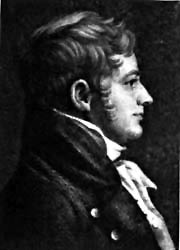 W
WJoseph Hopper Nicholson was an American lawyer, jurist, and politician from Maryland.
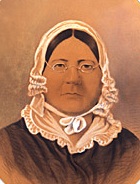 W
WMary Pickersgill was the maker of the Star Spangled Banner Flag hoisted over Fort McHenry during the Battle of Baltimore in the War of 1812. The daughter of another noted flag maker, Rebecca Young, Pickersgill learned her craft from her mother, and, in 1813, was commissioned by Major George Armistead to make a flag for Baltimore's Fort McHenry that was so large that the British would have no difficulty seeing it from a great distance. The flag was installed in August 1813, and, a year later, during the Battle of Baltimore, Francis Scott Key could see the flag while negotiating a prisoner exchange aboard a British vessel, and was inspired to pen the words that became the United States National Anthem.
 W
WGeorge Poindexter was an American politician, lawyer and judge from Mississippi. Born in Virginia, he moved to the Mississippi Territory in 1802. He served as United States Representative from the newly admitted state, was elected as Governor (1820–1822), and served as a United States Senator.
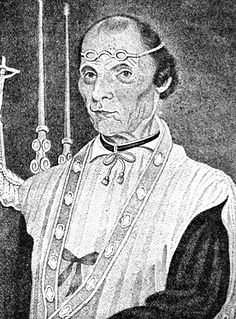 W
WFather Gabriel Richard was a French Roman Catholic priest and co-founder of the Catholepistemiad of Michigania. He was elected as a nonvoting delegate of the Michigan Territory to the U.S. House of Representatives for the 18th Congress, and was the first Catholic priest to be elected to that body.
 W
WMichael G. Shiner (1805–1880) was an African-American Navy Yard worker and diarist who chronicled events in Washington D.C. for more than 60 years, first as a slave and later as a free man. His diary entries have provided historians a first hand account of the War of 1812, the British Invasion of Washington, the burning of the U.S. Capitol and Navy Yard, and the rescue of his family from slavery as well as shipyard working conditions,1835 Washington Navy Yard labor strike, racial tensions and other issues and events of nineteenth century, military and civilian life.
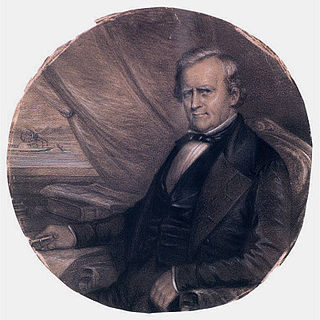 W
WHenry Miller Shreve was the American inventor and steamboat captain who opened the Mississippi, Ohio, and Red rivers to steamboat navigation. Shreveport, Louisiana, is named in his honor.
 W
WRobert Smith was the second United States Secretary of the Navy from 1801 to 1809 and the sixth United States Secretary of State from 1809 to 1811. He was the brother of Senator Samuel Smith.
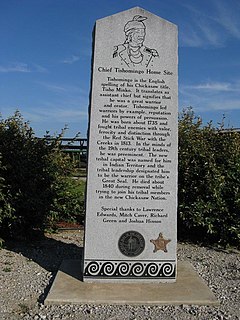 W
WTishomingo ; c. 1735 – c. 1837), also known as Tishominko, was chief of the Chickasaw nation until his death, c. 1837.
 W
WDominique You or Youx was a privateer, soldier, and politician.